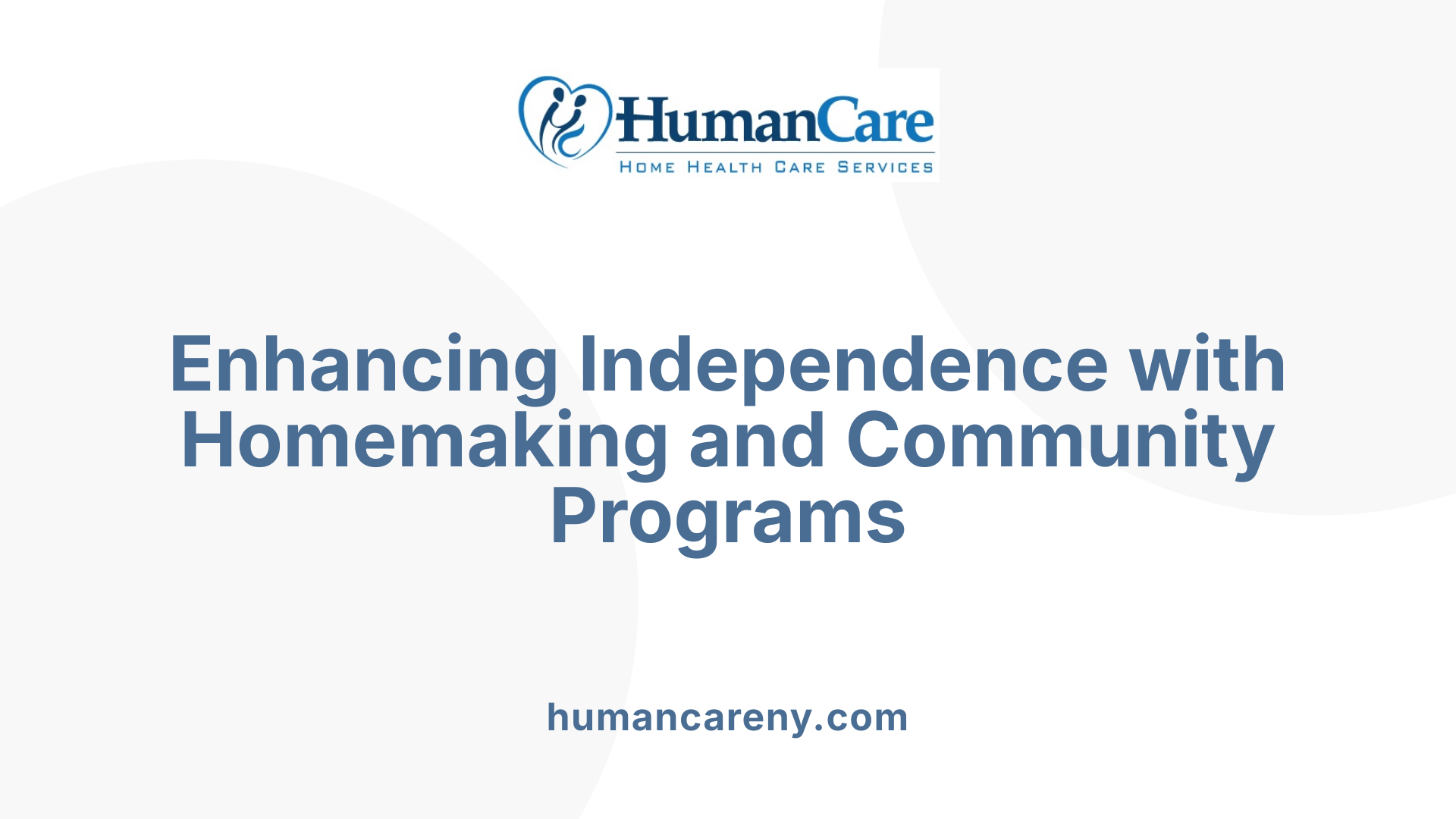Delaying Nursing Home Placement through Homemaking Strategies
As the population ages, the desire to remain in one's home for as long as possible has become increasingly important for seniors and their families. Homemaking care and community-based services are essential components in supporting aging in place. While evidence suggests that certain interventions may only provide modest delays in nursing home placement, a combination of personalized homemaking services, supported community programs, and comprehensive care planning can significantly influence how long older adults can live independently. This article explores the various aspects of homemaking care, community programs like PACE, and legal and caregiver supports that contribute to postponing long-term institutionalization.
The Role of Homemaking and Community Services in Aging in Place

How can homemaking and home care services influence the timing of nursing home placement?
Homemaking and home care services play a vital role in supporting seniors to maintain their independence and stay in their homes longer. These services often include help with daily activities such as cleaning, cooking, personal hygiene, and medication management. By providing this support, they can stabilize an individual’s health and prevent crises that might lead to a nursing home admission.
Evidence shows that increased use of homemaking services is associated with a modestly lower risk of moving into a nursing facility. For example, receiving more than five hours of homemaker services per month correlates with a 13% reduction in placement risk. However, general home and community-based services (HCBS), such as adult day programs or respite care, show mixed or limited effects on delaying institutionalization.
While some high-intensity and long-term interventions might provide small benefits, most studies suggest that homemaking alone is not enough. The overall effectiveness depends on individual circumstances, including health status, cognitive function, and caregiver support. Therefore, homemaking services are valuable but often need to be part of a broader strategy for delaying nursing home placement.
What evidence supports the effectiveness of homemaking care in delaying institutionalization?
Research indicates that more extensive utilization of homemaking and attendant care services is associated with a reduced likelihood of entering a nursing home. For instance, systematic reviews have reported that each additional five hours of homemaking services per month slightly lowers the risk of institutionalization.
However, in the broader context of HCBS, such as respite care or adult day programs, the evidence is less consistent. Some studies show only limited or no significant impact on delaying placement, especially when these services are used in isolation.
The complexity of older adults’ needs—such as cognitive decline, behavioral symptoms, or physical health issues—means that homemaking services alone often cannot prevent nursing home admission. Instead, combining homemaking with medical management, caregiver support, and health monitoring provides a more comprehensive approach. Overall, the current evidence emphasizes the importance of tailored, multifaceted support plans to effectively delay institutionalization.
What benefits does homemaking care offer for aging or health management to postpone the need for a nursing home?
Homemaking care improves quality of life by supporting seniors’ ability to handle daily tasks and feel secure in their environment. Through assistance with household chores, personal hygiene, and medication reminders, these services help reduce safety risks like falls or injuries.
Moreover, homemaking provides emotional support, companionship, and social engagement, which help combat loneliness and depression. Early detection of health deteriorations and chronic condition management are additional benefits, often resulting in better health outcomes.
This comprehensive support enables seniors to maintain their routines, independence, and well-being, often delaying the shift to more intensive and costly nursing home care. Ultimately, homemaking services contribute not only to health management but also to preserving dignity and autonomy among older adults.
What is the impact of home-based care on delaying nursing home use?
Home-based care encompasses informal caregiving by family members and formal services provided in the community. While it is a critical component of aging in place, its impact on delaying nursing homes varies.
Research suggests that informal caregiving, especially when extensive, may sometimes accelerate nursing home placement, particularly among those with severe functional impairments, given the recognition of their complex needs.
Paid home and community-based services, such as Medicaid-funded HCBS, show a modest reduction in the probability of nursing home entry, especially in the short term. However, systematic reviews highlight that many interventions, like caregiver support or respite care, produce mixed or limited delays.
The conclusion is that while home-based care provides essential support, alone it often does not substantially prolong community living. Effective delay strategies likely require combining home-based services with medical oversight, caregiver training, and tailored interventions.
How do programs like PACE and other community-based care alternatives help in delaying nursing home placement?
Programs such as PACE (Program of All-Inclusive Care for the Elderly) deliver comprehensive, person-centered services designed to support seniors in their homes. They combine healthcare, social services, transportation, and home help under a coordinated plan.
By addressing medical and social needs simultaneously, PACE reduces hospitalizations and prevents the progression of health issues that could result in nursing home placement. Participants receive services like home health visits, assistance with daily activities, and social engagement, enabling many to age in place successfully.
Community-based alternatives like assisted living, Medicaid waiver programs, and adult foster care also play roles in delaying institutionalization. They offer tailored housing and care options that meet individual needs while promoting independence.
Overall, these programs improve health and quality of life and are effective in postponing or avoiding the need for long-term nursing home care, particularly when early intervention occurs.
What legal, financial, and care planning options can help delay nursing home placement?
Proactive planning is essential to extend independence and delay nursing facility admission. Legal tools like irrevocable trusts can protect assets and ensure Medicaid eligibility when needed.
Financial strategies, including long-term care insurance and asset transfer arrangements, can provide resources for home-support services and reduce the financial burden of nursing home costs.
Care planning involves comprehensive assessments, aligning services with individual preferences, and ensuring legal documentation like advance directives are in place. Residents and families should understand their rights under federal and state laws to make informed choices.
Access to legal aid, counseling, and resources like residents' rights protections supports efforts to extend community living. Coordinated planning considers health conditions, caregiver availability, and personal wishes, shifting the focus toward maintaining quality of life and delaying institutionalization.
How can caregiver support and counseling impact the delay in nursing home placement?
Caregiver stress and burnout are significant predictors of early nursing home placement, especially for individuals with dementia. Support and counseling interventions can significantly reduce this burden.
Programs offering individual and family counseling, support groups, and ongoing telephone assistance help caregivers cope with emotional, physical, and financial challenges.
Enhanced caregiver satisfaction, better response to behavioral issues, and reduced depression symptoms have been linked to longer caregiving duration and delayed institutionalization.
Research shows that intensive support programs can extend the time seniors remain at home by nearly a year, benefiting seniors, caregivers, and society by reducing reliance on costly nursing homes.
In summary, investing in caregiver support and counseling services is a practical strategy to improve care quality and delay the need for institutional care, emphasizing the importance of holistic support systems for caregivers.
Integrating Formal and Informal Care Strategies to Support Aging in Place

Balance between formal homemaking services and informal caregiving
Supporting seniors to stay in their homes relies on a harmonious balance between paid home-based services and unpaid family caregiving. Homemaking services provided by professionals, such as assistance with cleaning, meal preparation, and personal care, can significantly delay nursing home placement by supplementing family efforts. For example, increased frequency and intensity of these services, including home-delivered meals and respite care, have demonstrated a statistically meaningful extension in community dwelling time.
Conversely, informal caregiving by family members remains a cornerstone of aging in place. Family caregivers, often spouses or adult children, offer vital emotional support and daily assistance, which are crucial when professional services are limited or unavailable. The combination of professional homemaking support and family care creates a safety net that can effectively address the complex needs of older adults.
Overall, a well-integrated approach leverages the strengths of both formal and informal care, fostering a supportive environment that maximizes independence.
Role of unpaid family caregivers in delaying institutionalization
Unpaid family caregivers are instrumental in delaying the transition to nursing homes. Their involvement helps maintain familiar routines, provides personalized supervision, and manages behavioral and health issues at home.
Research indicates that caregiver burden, including stress, depression, and physical exhaustion, is linked to higher risks of early placement. Access to targeted support—such as counseling, education on managing dementia or chronic illness, and respite care—can reduce caregiver strain.
Support structures like caregiver training and support groups improve confidence and resilience. Effective support enhances the caregiver’s ability to handle complex needs related to conditions like dementia or post-fall recovery, ultimately extending the period seniors can live independently.
Combined effects of professional services and family support
The synergy between professional home care services and family involvement significantly influences outcomes. When tailored services—such as adult day programs, skilled nursing care, and personal assistance—complement family efforts, seniors experience better health outcomes and increased stability.
For instance, the use of Medicaid-funded home and community-based services, including homemaker and respite care, has been associated with delayed nursing home placement. These services alleviate the physical and emotional load on family caregivers, making continuous home living more feasible.
Moreover, community programs like the Program of All-Inclusive Care for the Elderly (PACE) integrate medical, social, and personal care, promoting aging in place effectively. Such comprehensive models exemplify how combined professional and familial efforts can extend independence.
| Strategy Components | Examples | Impact on Delaying Nursing Home Placement |
|---|---|---|
| Formal Homemaking Services | Home-delivered meals, cleaning, personal care | Provide necessary support, reduce household hazards, and improve health stability |
| Family and Community Support | Emotional support, supervision, day programs | Maintain familiar routines, manage behavioral issues, and provide companionship |
| Combined Support Approaches | PACE, community care teams | Enhance coordination, prevent crises, and prolong community residence |
Understanding and promoting these integrated strategies can help policymakers, caregivers, and healthcare providers develop programs that better support aging in place, ultimately reducing premature nursing home admissions.
Maximizing Independence in Aging
While current evidence reflects limited overall effectiveness of some interventions in significantly delaying nursing home placement, it underscores the importance of a layered, personalized approach combining homemaking services, community programs like PACE, legal and financial planning, and caregiver support. Improving the quality, intensity, and coordination of these supports can make a meaningful difference in helping seniors maintain their independence longer. Policymakers, healthcare providers, and families should prioritize integrated, comprehensive strategies that address medical, functional, and emotional needs. Ultimately, empowering older adults to stay in their homes not only enhances their quality of life but also reduces the societal and financial burden associated with premature institutionalization.
References
- Interventions to Prevent or Delay Long-Term Nursing Home ...
- Does Home Care Prevent or Defer Nursing Home Use? - HHS ASPE
- [PDF] and Community-Based Services and Time to Nursing-home placement
- Causes of nursing home placement for older people with dementia
- [PDF] Does Home Care Prevent or Defer Nursing Home Use? - HHS ASPE
- How to Delay Nursing Home Placement with PACE
- Home Care | Department of Health and Human Services - Maine.gov
- Health Issues Seniors Experience that Lead to Needing Nursing ...
- How to Stay Out of a Nursing Home (And Get the Care You Need at ...



